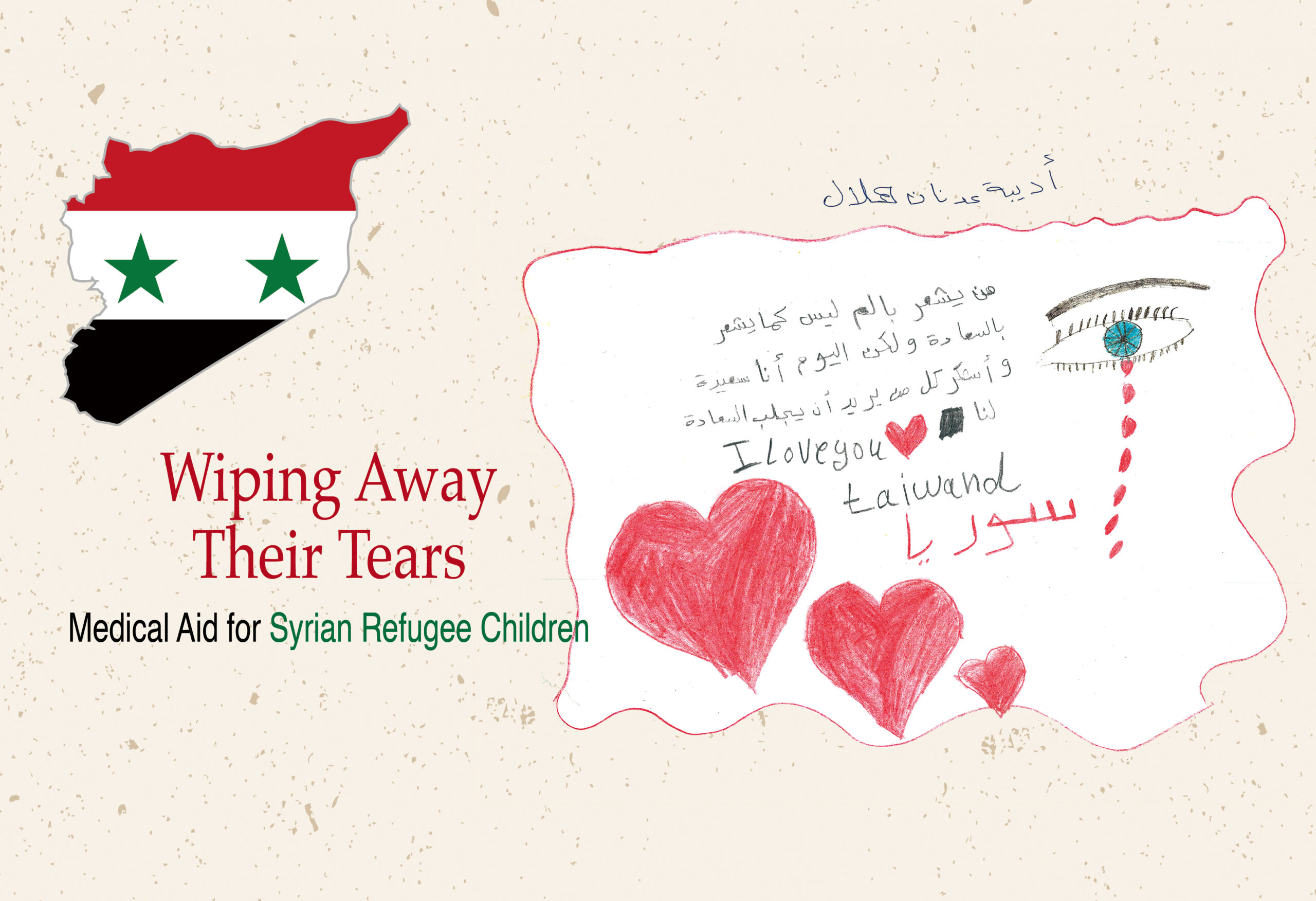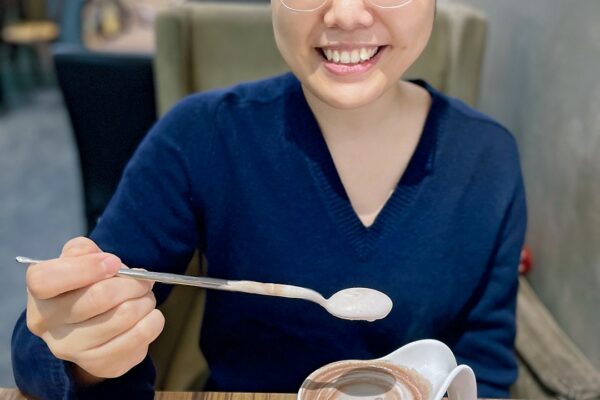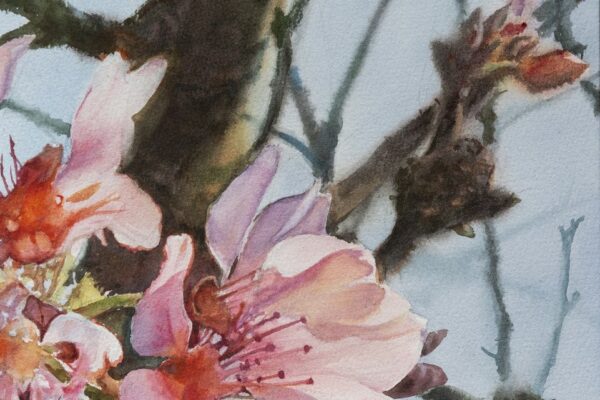
By Su Fang-pei
Translated by Wu Hsiao-ting
Photos edited by Yan Lin-zhao
Adeebah Adnan Hilal, a Syrian refugee child who drew the picture on the right, said that the red tears are shed for Syria, and the red hearts stand for the love of Tzu Chi Jordan. Over the last 11 years, the Tzu Chi branch has helped over a thousand Syrian children in Jordan receive medical treatment.
Jordan, officially the Hashemite Kingdom of Jordan, is located in the Middle East. Covering an area of 89,342 square kilometers (34,495 square miles), it is just a little larger than Austria. Bound by Syria to the north, the country is currently hosting 870,000 registered Syrian refugees. If unregistered refugees are also taken into account, the actual number is estimated to surpass 1.3 million. Some of the refugees live in camps established jointly by the United Nations and the Jordanian government; others are scattered in tented settlements in the deserts or in dark corners across urban areas.
These Syrians crossed their southern border into Jordan to escape from the civil war in their country. Entire families were uprooted, seeking a chance to survive. Sadly, many were killed before they could make it to safety. Some of those who were lucky enough to cross into Jordan are now living with the heartrending memories of seeing their own family members cruelly killed. Even without such trauma, life as a refugee in a foreign land is rarely easy. One of the issues is medical care. In the Arabian world, large families are favored. While many Syrians chose to flee their home country for the sake of their children, they are often helpless when their young ones fall ill in a country not their own.
Most of Jordan is desert. The country relies heavily on imported goods. Living expenses, including food, clothing, housing, and transportation, are relatively high. This is so for a regular Jordanian citizen, let alone for a refugee for whom landing a job that pays enough is a challenge—even if he or she is well equipped with marketable skills. Thus, if refugees or their family members become sick, and if the treatment involves major surgery, paying the medical bill can become a serious burden.

To this day, 80,000 Syrian refugees still live in the Zaatari refugee camp in Jordan. There are doctors in the camp for residents, but no surgical services. There is also no financial aid for refugees who need medical treatment. Lamiya Lin
The Syrian civil war erupted in the spring of 2011. In the winter of the same year, Tzu Chi volunteers in Jordan started reaching out to Syrians who had fled to their country. “In 2013, after overcoming a lot of difficulties, we began helping Syrian refugees obtain medical treatment,” said Chen Chiou Hwa (陳秋華), the head of Tzu Chi Jordan, as he recalled the branch’s first medical cases involving Syrian refugees. “We helped a refugee undergo cataract surgery, and another to be operated on for a corneal condition.”
In November 2014, the United Nations stopped assisting refugee camp residents with their surgical needs, forcing those with such needs to find help themselves—from charitable organizations or other sources. Many people have turned to Tzu Chi for help.
With the help of Dr. Mohanad Salahi, a Syrian physician, Tzu Chi Jordan joined hands with Arabian Medical Relief Hospital in the Zaatari refugee camp to provide medical aid to refugee children. Since they started, they have helped over a thousand children with conditions ranging from imperforate anuses (a birth defect in which there is no opening where the anus should be) and tonsillitis to hernia and other conditions.
Chen Chiou Hwa vividly remembers the helplessness of some parents whose children had imperforate anuses. Unable to defecate, the little ones’ abdomens were swollen. Their parents took them, extremely weakened, to the doctor for treatment, but they were either turned away due to the seriousness of their children’s conditions, or had no choice but to give up treatment midway because they couldn’t pay the medical bill. Dr. Salahi helped Tzu Chi evaluate the conditions of the young patients, then sent them to hospitals outside a refugee camp for surgery.
“Other international NGOs pick up only part of the tab when it comes to helping refugees obtain treatment,” Chen explained, “and the refugees need to go to the organizations themselves to receive the financial aid. Tzu Chi, on the other hand, pays in full, and our volunteers personally deliver the financial aid to the refugees.” The head of Tzu Chi Jordan said that at first some refugees were wary of the foundation and suspected that they might have ulterior motives in helping them, but after 11 years of consistent, unconditional giving, Tzu Chi now has the full trust of refugees.
In addition to financing medical treatments, Tzu Chi conducts free clinics and provides daily necessities for refugees, whether they are living in a camp or not. There are now 287 families receiving long-term care. The foundation even continued their services for people with medical needs during the COVID-19 pandemic. Over the last two years, they have facilitated more than 400 surgeries and helped more than 2,000 people be checked by the doctor or obtain medications.
Tzu Chi also addresses the educational needs of refugee children. For example, volunteers initiated a work relief program in a tented settlement in the village of Huweyja, near the Zaatari refugee camp, in which some refugees live. Tzu Chi’s program pays refugee teachers to give lessons to children in the settlement. Tzu Xin House, a shelter for refugee mothers and children, is another place Tzu Chi has reached out to help. For over seven years now, Tzu Chi has provided tuition aid for the children there, in addition to helping the shelter pay its rent. The care volunteers have extended to the shelter—they tried every means even during lockdowns to deliver necessities to the shelter—moved refugee mothers there so much that they began volunteering for Tzu Chi.
The sadness that comes from being forced from their homes and enduring a lack of medical resources have persisted for the refugees. As long as their sorrow and difficult situations persist, Tzu Chi will be there for them. May all dark corners in the world be illuminated by light. May all the tears that refugees shed in their helpless situations turn into blessings and help refugee children in the deserts grow up in peace and safety.



